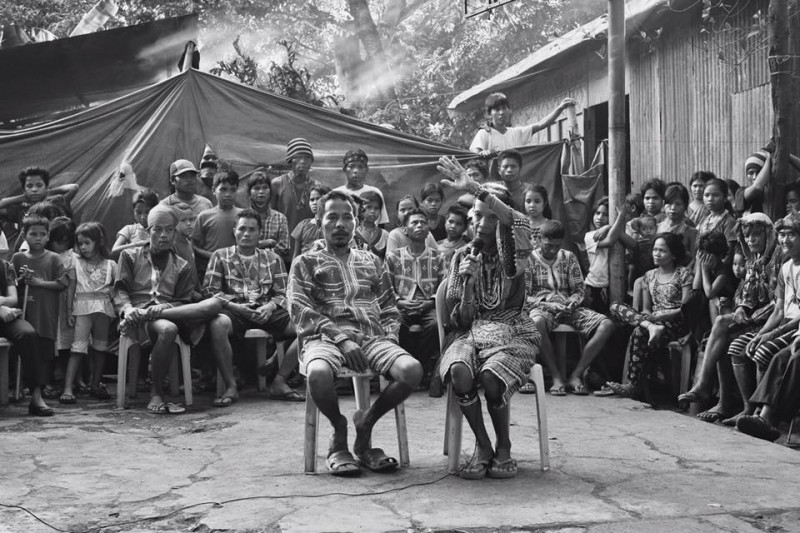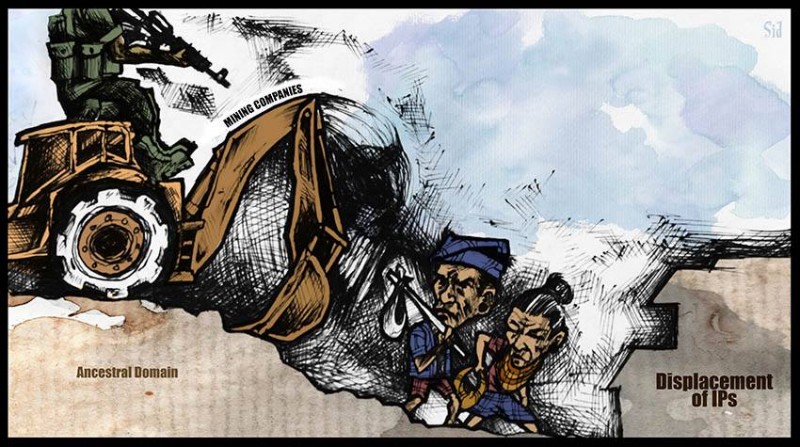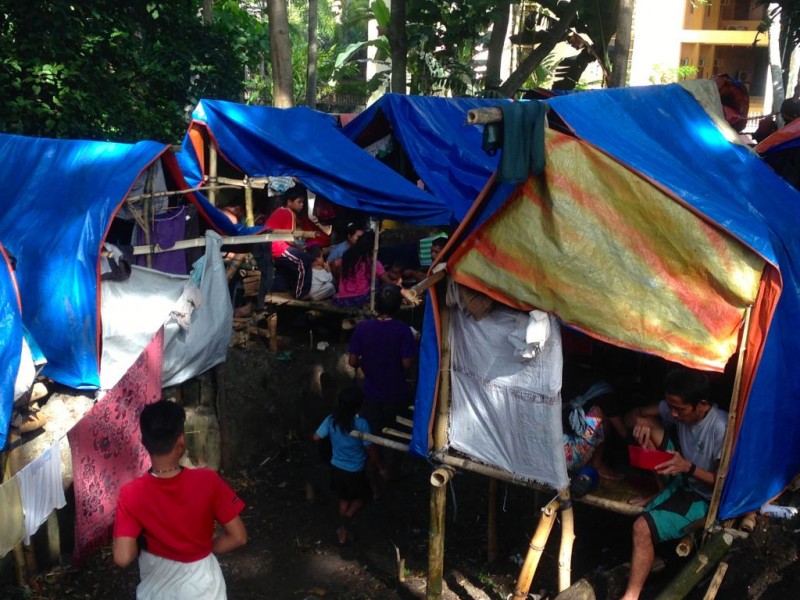 [1]
[1]Tribe leaders who sought refuge in Davao City demand the removal of soldiers in their village. Photo from the Facebook page of Terry Ridon
Human rights activists and politicians have criticized [2] the Armed Forces of the Philippines (AFP) for distorting a statement by Chaloka Beyani, United Nations Special Rapporteur on the Human Rights of Internally-Displaced Persons (IDPs).
A press release [3] issued by the AFP’s Eastern Mindanao Command quoted UN's Beyani as saying that the internally displaced indigenous peoples who have sought refuge in a church compound in Davao City are “not evacuees, but victims of trafficking.”
Beyani issued a strongly-worded statement reiterating that the military press release is “incorrect, unacceptable, and represents a gross distortion of [his] views on this issue.”
Ata-Manobos say they were forced out of their homes
Over 700 Ata-Manobos have been staying at the United Churches of Christ in the Philippines (UCCP) Haran Mission House compound in Davao City, located in the southern part of the Philippines, since May of this year. They assert that they were forced to leave their homes in Talaingod, Davao del Norte and other parts of Mindanao because of the alleged heavy military presence and forced conscription into government-backed paramilitary groups in their communities.
The police attempted to “rescue” [4] the Ata Manobos last July 23 by forcibly removing [5] them from the church compound and returning them to their villages. The Ata Manobos, however, resisted and asserted that they will not return until military troops are pulled out from their homes. The military and the police have filed cases of human trafficking [6] against rights advocates and church workers who have helped the Ata-Manobos seek sanctuary in the UCCP compound.
UN official report
Rights advocates questioned the military’s version of Beyani’s statements, saying this directly contradicted the official report [7] issued by Beyani after concluding his 10-day visit to the country:
I heard from the AFP [military] its assertion that it is seeking to protect the communities and provide services to them in conflict regions; however the displaced IPs made it clear that it is their presence and that of the paramilitary groups in their communities that continues to create anxiety amongst the indigenous communities. The community wishes to return to its lands but stressed to me that they will only feel safe to do so if the long-term militarization of their region comes to an end and they can return with guarantees of safety, dignity and protection.
Beyani’s media liaison reiterated [9] that his exit statement “represent the official findings and views of the Special Rapporteur, including in relation to those indigenous people in Davao.”
Aside from insisting that the refugees were victims of human trafficking, the military has quoted Beyani as saying that the refugees were “manipulated” by activist groups into being “trafficked” and “detained” in the UCCP compound. In fact, the recording indicates [10] that it was the police who stormed the church compound who were referred to as “manipulated.”
Bayan Muna (Nation First) Representative Carlos Isagani Zarate said [2] that the distortion of the UN official’s statement was meant “to discredit him, undermine his official actions as well as the UN mechanisms.” Gabriela Women’s Representative Luzviminda Ilagan meanwhile said that the incident is “a grievous diplomatic faux pas that puts the Philippine government which invited Dr. Beyani in an awkward and embarrassing situation.”
In her blog [11], journalist Inday Varona pointed out that the video recordings of Beyani’s exit briefing with army officials in Camp Aguindaldo released by the military prove that they actually left out key passages in their version of Beyani’s statement:
Did the the AFP break protocol in leaking the conversation with Beyani? Only the UN office can answer that. The leak does show the truth. It shows the public that the AFP did delete substantial and critical portions of Beyani’s statements.
Military apologizes, spokesman steps down
The AFP had issued [12] an official statement that it is standing by its own interpretation of Beyani’s remarks. But today, they apologized to the UN official. Furthermore, the spokesman of the regional unit of the army has resigned his position.
 [13]
[13]The ancestral domains of Mindanao lumads are also threatened by large-scale mining activities. The report of the UN official also tackled the displacement of tribal villages in South Cotabato, where an open pit mining project is being proposed. Cartoon from the alternative media group Davao Today
During his visit to the Philippines, Beyani also met with typhoon Haiyan (local name “Yolanda”) survivors and war evacuees in Zamboanga. He expressed [7] concern about the poor conditions of Haiyan [14] survivors, saying that many of them continue to live in grossly defective temporary shelters almost two years after the world’s strongest storm hit the Philippines in November 2013.
According to international humanitarian groups, there are as many as 260,000 IDPs in the Philippines [15] who are victims of extreme natural disasters and armed conflicts in various parts of the country.
To protect the rights of IDPs, the UN official recommends [16] the passage of a draft law that was vetoed by the the country's president in 2013. The law would strengthen government agencies’ commitment to recognizing and promoting the welfare of IDPs.
